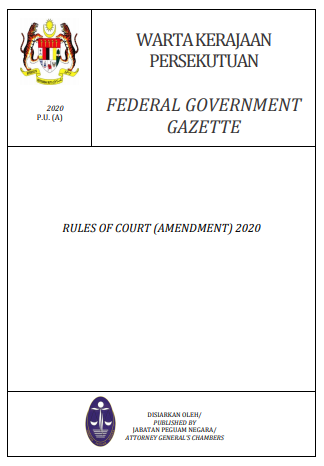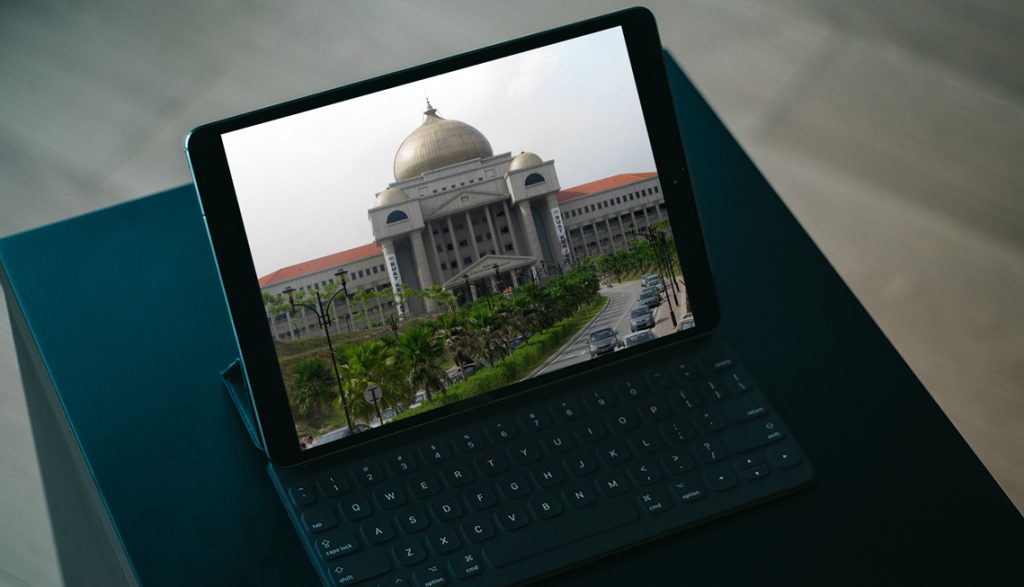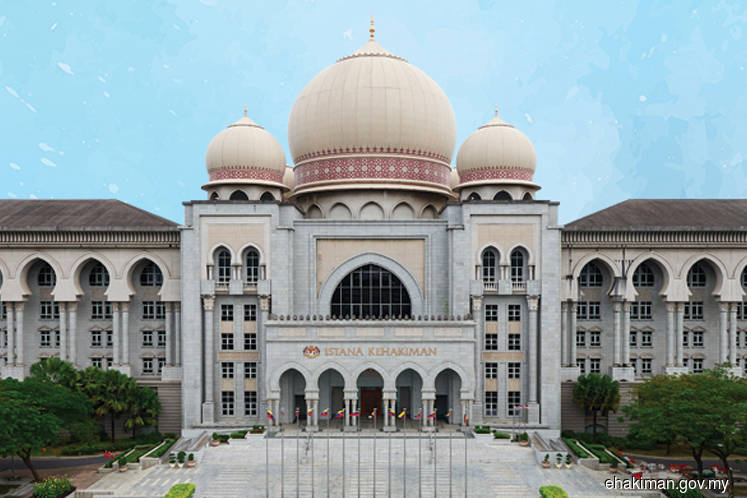The Office of the Chief Justice of the Federal Court of Malaysia recently drafted proposed amendments to the Rules of Court 2012, Rules of the Court of Appeal 1994 and Rules of the Federal Court 1995. These proposed amendments have been circulated to the Bar Council and its members for feedback.
Summary of Proposed Amendments

In essence, these proposed amendments can be summarised as follows:
• The Court can now direct a hearing or trial to proceed online, even if any party objects to it (the current practice is that online hearings will only be arranged if both parties have consented to it). This can be decided by the Court itself, or upon application by any party.
• The Court can direct for any person (often litigants or representatives of parties) to attend these online hearings.
• The Court can direct witnesses in a trial to give evidence online. Consequently, the Court can also direct for examination, cross-examination and re-examination of witnesses to be done online.
• If a witness or party is a prisoner, he/she can only give evidence online if the consent of (a) the parties and (b) the Officer in Charge referred to under the Prison Act 1995 has been obtained.
• Before making such orders above for online hearings, the Court must be satisfied that sufficient administrative and technical arrangements are put in place
• The Court can revoke, suspend or vary its directions for an online hearing if (a) the necessary technology stops working causing unreasonable delay, (b) it would result in unfairness to parties, (c) there has been material change in circumstances after such direction was made, or (d) it is necessary in the interests of justice.
• In line with the “open justice” principle, the Court can direct these online hearings to be broadcasted for viewing by members of the public, or a recording of these online hearings can be arranged.
• Whenever an application requires leave of the Court to proceed, it shall be determined without any oral hearing. In exceptional circumstances, the Court may direct such application for leave to be dealt with an oral hearing.
• Specifically for cases of leave to appeal to the Federal Court, the Federal Court may determine such matters without an oral hearing. Such decision is final and conclusive, and there shall be no re-hearing unless there are exceptional circumstances.
Online Hearings: A Step in the Right Direction

Pic Credits: GovInsider
Overall, these amendments are definitely a step in the right direction. Online hearings have been a norm for many years in the UK, Australia and other jurisdictions. The silver lining of the Covid-19 pandemic is the acceleration of Malaysia’s adaptation to online hearings.
Online hearings can address situations of a pandemic where congregation of lawyers/litigants in confined court spaces are to be avoided. This also saves time, cost & energy of lawyers, litigants and parties who are physically immobile, based overseas or in faraway states.
That being said, the “golden rule” in litigation will always be a physical hearing. There is no replacement for observing a witness’ demeanour in person in a crucial cross-examination, or to analyse a judge’s facial expressions in the flesh as a lawyer valiantly puts forth a contentious legal argument.
Therefore, to the best the Court can accommodate, an actual physical hearing should always be arranged.
5 Key Concerns
However, there are 5 concerns which I have identified from the proposed amendments. This is by no means exhaustive and limited to my experience as a civil litigator. This is also not a criticism of the Judiciary, but a genuine intention on my part to improve the rules and to trigger a discussion on what fits best for our justice system moving forward.
# 1. No Directions (Yet) on Safeguards to Prevent Coaching of Witnesses
One of the primary concerns for online hearings is the increased likelihood of witness coaching. It could come in a variety of creative forms – a separate window to display a WhatsApp group chat with lawyers, text messages to a witness’ phone, etc.
The proposed amendments have not sought to address these concerns yet. It is possible that the Chief Justice may do so through the issuance of practice directions via the proposed Rule 92 Rule 3B.
My suggestion is for the rules or practice direction to adopt safeguards deployed in other jurisdictions to prevent witness coaching, such as:
(a) Requiring a separate camera to be installed which records the witness from a different angle, his/her computer monitor & surroundings. This allows the judge and opposing party to have a complete view of the witnesses’ environment, thus minimizing the chance of coaching.
(b) Establishing dedicated rooms in court complexes/designated centres around Malaysia for purposes of witnesses giving evidence. Such rooms can be monitored by a neutral court officer to prevent coaching.
(c) Parties agreeing to hire a neutral third party (at their own expense) to monitor witnesses at the witnesses’ respective physical locations (home, office, etc.)
# 2. No More Oral Hearings for Judicial Review Leave Applications
The proposed amendments provide that there will be no oral hearings required for all leave applications. This presumably also includes judicial review applications under Order 53.
Dispensing oral hearings for straightforward leave applications such as leave to amend a pleading (Order 20 Rule 5) makes sense. However, it is a different case altogether for leave applications which may involve highly contentious issues & where a dismissal would shut the door on a litigant completely from the substantive stage. A judicial review leave application is one such case.
Issues which may take a contentious turn in judicial review: whether a subject-matter is justiciable or otherwise, if alternative remedies have been exhausted, the issue of locus standi, etc.
It is also important to note that judicial review is often the last bulwark for private citizens to hold the State into account and to uphold the rule of law. We must therefore be very careful of ceding counsel’s opportunity to orally address the Court in high-stakes public law matters.
The “exceptional circumstances” test which parties must meet for an oral hearing to be fixed in the proposed Order 92 Rule 2B(2) is, with respect, too high a threshold to meet and would shut out many deserving cases.
My suggestion is to continue to allow parties to orally address the Court in judicial review leave applications. To save judicial time or to enforce social distancing, this can be done through an online hearing.
# 3. No More Oral Hearings for Federal Court Leave Applications
Any appellate lawyer would tell you that a Federal Court leave application is one of the most challenging facet of litigation. It is an especially uphill battle for the applicant. Statistically, only around 20% of such leave applications will succeed.
More importantly, it is the final stage of appeal where either millions will be at stake or a defining public law issue will be in the spotlight.
Many lawyers and parties would hence prefer, at the very least, an opportunity to orally address the Court to convince the Bench on the utility of their questions of law.
The US & UK Supreme Court regularly determine permissions to appeal on the papers alone. It is also my understanding that the Singapore Court of Appeal has powers to determine any application without oral hearings.
I nonetheless believe there is still great utility in having oral arguments for Federal Court leave applications.
My suggestion is for the Federal Court to continue to allow oral hearings for leave applications. To save judicial time, a time-limit for oral hearings (15 minutes) can be imposed on parties. This does not take away the opportunity to submit orally & also saves previous court time.
If the Court still feels it is burdened by leave applications, it is perhaps the interlocutory applications at the Federal Court (stay, discovery, etc.) which should be determined without oral hearing instead of leave applications.
# 4. Ambiguity on the Status of Oral Hearings in Court of Appeal Leave Applications
It is peculiar to note that the proposed amendments to the Court of Appeal Rules 1994 do not specifically state if oral hearings for leave applications to the Court of Appeal will be dispensed with (while the proposed amendments to the Federal Court Rules 1995 specifically provides so).
The proposed amendments to the Court of Appeal Rules 1994 nonetheless do state that:
(a) the procedure in the Rules of Court 2012 (including the part where there shall be no oral hearings for all leave applications) apply mutatis mutandis to the Court of Appeal; and
(b) the Court can direct any cause or matter to be heard online.
It is perhaps best if the Court can clarify if it intends to also do away with oral hearings for leave applications for the Court of Appeal. If so, the same suggestions which I have stipulated above equally apply.
I previously wrote that the Rules of the Court of Appeal 1994 do not specifically state if oral hearings for leave applications to the Court of Appeal will be dispensed with (see strikethrough above).
I subsequently discovered I had overlooked the proposed insertion of Rule 28A(6) to the Rules of the Court of Appeal 1994 which states: “The Court may deal with and determine the application without any oral submission, unless the Court otherwise directs.”. Therefore, my earlier analysis no longer applies. To that end, I apologise for overlooking this.
Nevertheless, there is another curious discovery: unlike the proposed amendments to the Rules of the Federal Court 1995, the proposed amendment to the Rules of the Court of Appeal 1994 do not have a similar provision which states that the Court’s decision for leave applications is final, conclusive and there shall be no re-hearing unless they are “exceptional circumstances”.
Does it mean that the threshold to re-visit leave applications in the Court of Appeal will be lower than leave applications to the Federal Court? It is perhaps best if the Court can clarify on this.
# 5. No Details (Yet) on How Online Open Justice Will Come Into Effect
The proposed amendments do not yet provide details on how such online hearings are to be broadcasted for viewing by members of the public.
This may probably be an internal administration issue for the Courts to finalise, but it is important for us to know how “open justice” can be a reality in Malaysia.
Will all Court proceedings be broadcasted to the public? Or only the superior Courts? Will it be live-streamed? Or will it be merely be recorded and then made accessible 2-3 days later?
It would be greatly beneficial if the Court can provide clarity on this.
